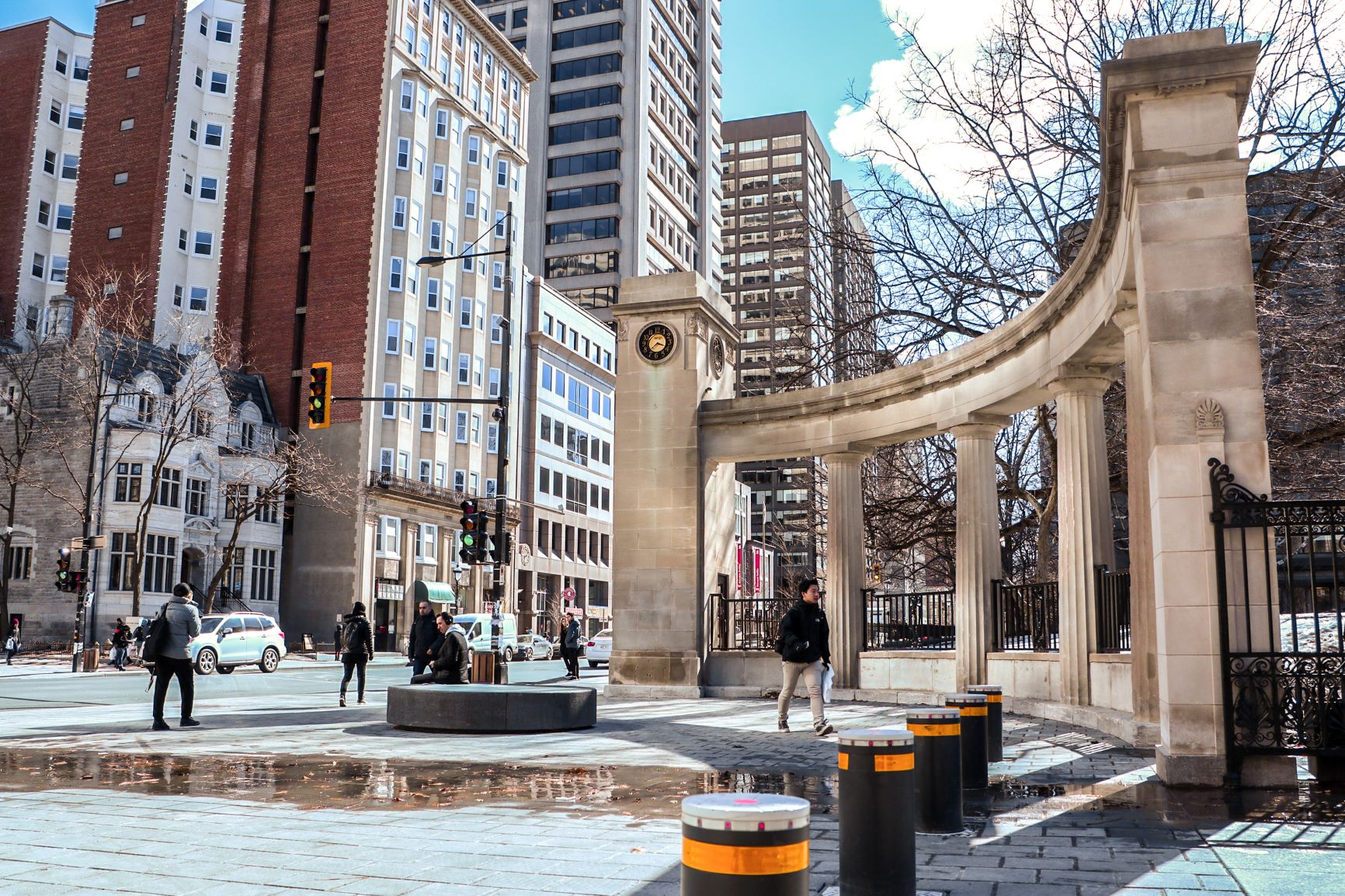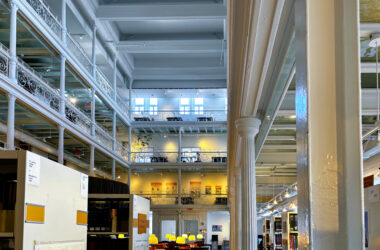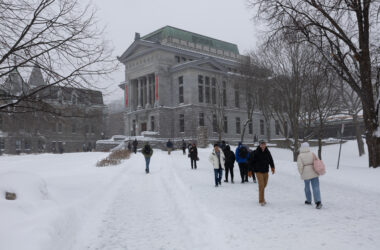Adjusting to any new setting is a natural, but challenging part of life, and one’s first year at university is no exception. As you launch yourself into a new journey amongst the wilderness of McGill, the elders, better known as upper-years, leave behind some tokens of wisdom.
Before embarking into the exciting world of university life, the most eager have already made a campus checklist of potential supplies, from bedding to notebooks. However, there are often overlooked items that make the dorm experience more enjoyable. For Fred LePage, U3 Computer Science and History, a simple speaker proved to have more uses than just creating an ambiance in his room.
“A speaker makes you a valuable recruit to any social gathering, though not if others get the same idea,” LePage said.
As great as speakers are, Gwenyth Wren, U3 Environment and African Studies, recommended something to combat the likely noise in dorms.
“I can’t overemphasize [having earplugs] if you’re like me and [had] super loud […] people on your floor screaming at 2 a.m.,” Wren said.
Dylan Havelock, U3 Computer Engineering, prioritized keeping his room comfortable, particularly after the hikes to the Upper Residences.
“If you’re going to include one thing, I’d say [it would have to be] the fan,” Havelock said. “I think [mine] ran for eight weeks straight.”
Outside of the many climbs up the mighty hill that is the McGill campus, another aspect of university life that newcomers and seasoned students alike must endure is picking classes and setting up a schedule. Students should know that they don’t need to have a perfect schedule when the semester begins as there is an Add/Drop period in the first three weeks of the term that allows students to try courses for which they might not have not registered.
“Add/Drop is your friend,” Wren said. “If you are entering [as a] U0, play around with classes and see what you like.”
There are many different tools that students can use when choosing the perfect class. For those avoiding the dreaded 8:35 a.m. class at Stewart Bio or who want a day off in the week, the Visual Schedule Builder (VSB) displays potential schedules, including course instructors and locations. RateMyProfessors is another useful tool. On this website, students can read through the reviews and experiences of other students for a given professor’s classes.
“A good way to measure your decision […] is how the prof is rated online,” LePage said. “You’ll be spending several hours a week with this person so get used to them.”
Course evaluation sites and Facebook groups are great ways to find the coveted “bird courses” at McGill. However, Aisha Manneh, U3 International Development Studies, suggested that doing well in electives doesn’t always mean filling your schedule with the usual suspects.
“Pick electives in things you’re interested in and it’ll almost always be an easy A if you enjoy the work,” Manneh said.
Furthermore, students should also understand that sites like RateMyProfessor or the McGill subreddit do not always paint the full picture.
“You should be honest with yourself and pick things you’re interested in,” Iyanu Soyege, U2 Political Science and African Studies, said. “[Don’t] let the bad experiences of others determine what you do.”
For students, it is key to pick classes on subjects that they feel they can immerse themselves into for hours, especially when the dreaded midterm season rolls around. It is also important during this exhausting period to find the ideal place to prepare for impending exams, and the dorms may not be the ideal place.
“Around residence, it can get pretty distracting, so it’s good to use the libraries,” Havelock said. “Everyone is […] in that study mode, and it just rubs off on you and […] helps you focus.”
While students will have to wait for Schulich Library’s facelift, there are still an abundance of options from the ultra-quiet Islamic Studies Library to the conversation-friendly floors in Redpath.
“The Law Library [is] […] definitely worth the hike,” Manneh said. “It’s super quiet though, so not a good place to whisper with your friends but great for getting some serious studying done.”
Outside of the routine of studying around Milton-Parc, Montreal is full of unique neighbourhoods that many students often don’t see since they typically stay within their comfort zone near campus. Leon Picha, U0 Management, suggested one inexpensive way to get out of the McGill Bubble and explore the city.
“I used to go on the Metro, and when I’d find a cool sounding station, I’d just get off and walk around,” Picha said.
The iconic Mount Royal Park can also give students a chance to escape the urban setting in the middle of the city.
“There’s […] the main path, but there [are] also these little trails,” Havelock said. “If you’re an outdoorsy person and want to get that nature fix in Montreal, it’s a really good spot.”
Overall, Montreal is a fantastic city with so much to offer. Whether it be the Musée des Beaux Arts, an Old Port eatery, or a nightclub in the Plateau, people can seek out all different kinds of entertainment. A particular favourite for first years to venture out to are the nightclubs on St. Laurent Boulevard. The street is jam-packed on Thursday nights as the popular nightclub Tokyo hosts a combination of the Top-50 hits playlist and 3-for-$10 Jägerbombs. This tradition has become iconic, to the point that ‘Tokyo Thursdays’ are part of the McGill vernacular. Wren reiterated the importance of this Montreal institution.
“Tokyo will always have my heart, and my Thursday nights,” Wren said.
Above all, it’s worth acknowledging that McGill’s ‘work hard, play hard’ mentality can get overwhelming; first-year students must not forget to take care of themselves throughout the school year. Spending time with friends away from nightlife settings is a great way to practice much needed self-care.
“Your friends [are] going to understand the stress you feel better than anyone else,” Manneh said. “Try and schedule in […] chill time with your friends outside of the club.”
When you are among friends and peers alike at McGill, remember to avoid the habit of comparing yourself to them, even if they seem to be getting amazing grades or finding their own social groups. It may appear that you are isolated in feeling inadequate or apprehensive, but the truth is that everyone is going over their own hurdles and many will share similar anxieties.
“It [may] seem like everyone is doing better at school, doing better at making friends and managing better than you, but that’s not true,” Wren said.
Most importantly, no one should feel like they are alone when navigating the sometimes uneasy waters of first year. There are always people there for you.
“You may feel a lot of pressure, but remember there are always people […] who are there to support you, whether it be your family, friends, floor fellows, or other services offered by McGill and SSMU,” LePage said.









